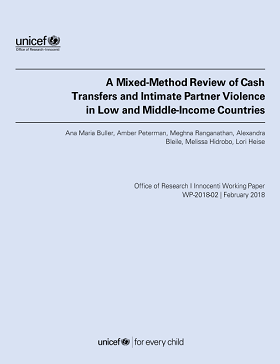A mixed-method review of cash transfers and intimate partner violence in low and middle-income countries
There is increasing evidence that cash transfer (CT) programs decrease intimate partner violence (IPV); however, little is known about how CTs achieve this impact. We conducted a mixed method review of studies in low- and middle-income countries. Fourteen quantitative and nine qualitative studies met our inclusion criteria, of which eleven and six respectively demonstrated evidence that CTs decrease IPV. We found little support for increases in IPV, with only two studies showing overall mixed or adverse impacts. Drawing on these studies, as well as related bodies of evidence, we developed a program theory proposing three pathways through which CT could impact IPV: 1) Economic security and emotional wellbeing, 2) intra-household conflict, and 3) women’s empowerment. The economic security and wellbeing pathway hypothesizes decreases in IPV, while the other two pathways have ambiguous effects depending on program design features and behavioural responses to program components. Future studies should improve IPV measurement, empirical analysis of program mechanisms, and fill regional gaps. Program framing and complementary activities, including those with the ability to shift intra-household power relations are likely to be important design features for understanding how to maximize and leverage the impact of CTs for reducing IPV, and mitigating potential adverse impacts.



